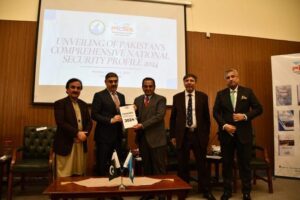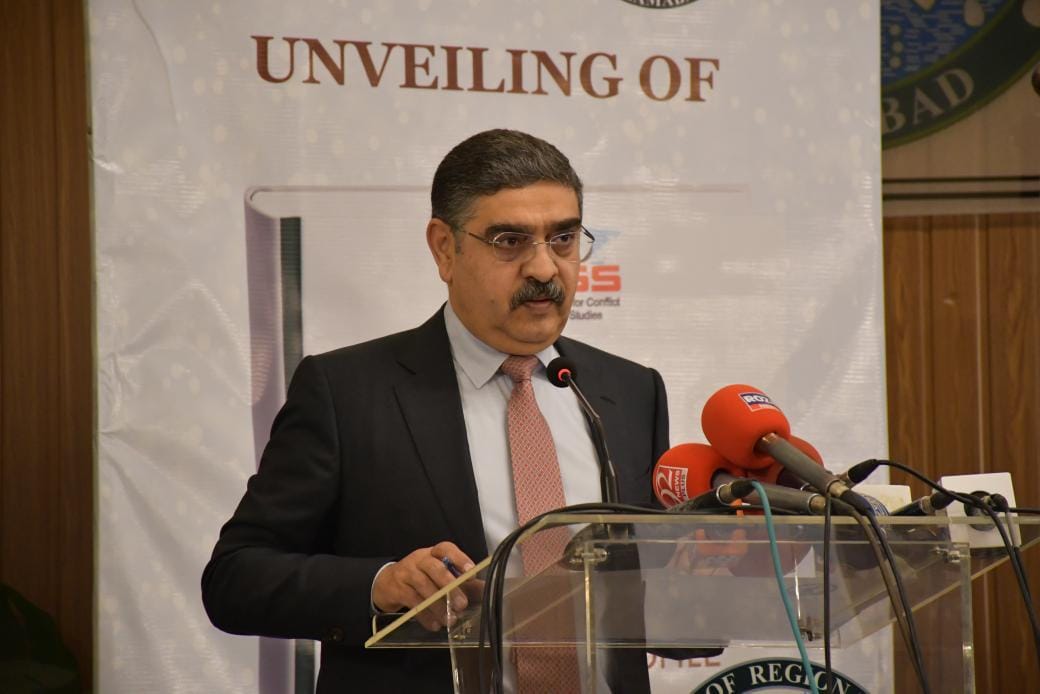PICSS launches Pakistan’s Comprehensive National Security Profile 2024
Islamabad ( WNAM REPORT): The Pakistan Institute for Conflict and Security Studies (PICSS) launched its Pakistan’s Comprehensive National Security Profile 2024 at the Institute of Regional Studies in Islamabad. The event was attended by diplomats, think tank representatives, policy experts, and business leaders. The report provides a detailed analysis of Pakistan’s security landscape, with a focus on the evolving strategies of militant groups.
Former Caretaker Prime Minister Senator Anwar ul Haq Kakar, the Chief Guest, attributed the rise in terrorism to the proliferation of NATO’s leftover weapons and gadgets now in the hands of militants. “We cannot afford to leave this region like the Americans left Afghanistan. If it takes a century to fight terrorism, Pakistan will do so. This is not just a battle against militants; it’s a fight for regional stability,” he emphasized.
The former Prime Minister also critiqued the notion of justifying terrorism, stating, “In 2014, terrorism wasn’t defeated—it merely relocated to Afghanistan. When the environment became conducive, militants struck back. We must discourage the phenomenon of rationalizing terrorism under any pretext.”
Nasir Qureshi, President of the Islamabad Chamber of Commerce and Industry, emphasized the importance of data-driven insights. “Reports like Pakistan’s Comprehensive National Security Profile 2024 are invaluable for the business community. They help us strategize and plan in an uncertain security environment,” he said.
He urged all the stakeholders to view this report as a call to action. By aligning our strategies with the realities highlighted here, we can strengthen Pakistan’s economy and contribute to its long-term stability. The private sector is not just a participant but a key partner in nation-building, and our role has never been more critical.
Ambassador Jauhar Saleem, President of the Institute of Regional Studies, highlighted the collective nature of the challenge and called for international cooperation. “Terrorism is a shared threat, and Pakistan should not be left alone to bear the burden. Winning the fight against terrorism requires winning hearts and minds,” he remarked.
Abdullah Khan, Managing Director of PICSS, focused on the operational and propaganda strategies of militant groups. “Despite differing ideologies and goals, terrorist groups operating in Khyber Pakhtunkhwa and Balochistan are employing similar tactics, such as showing territorial control through public displays. This raises the question of whether these groups share a common handler. Additionally, their media wings have grown increasingly sophisticated, enhancing their ability to spread propaganda,” he noted.
Gul Dad, Director of Research at PICSS, shed light on the security challenges along Pakistan’s western border. “The entire western frontier is now under threat from various terrorist groups. Moreover, these militants are attempting to reestablish their presence in urban centers of Punjab and Sindh, which poses a significant danger to national security,” he explained.
The event concluded with an engaging discussion on Pakistan’s counter-terrorism strategies and the importance of international collaboration to combat militancy. The Pakistan’s Comprehensive National Security Profile 2024 serves as a critical resource for policymakers, security experts, and international stakeholders in understanding and addressing Pakistan’s evolving security challenges.


